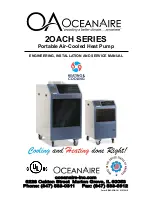
Product Description
52
TT Twin-Screw Pump -
Installation, Operation & Maintenance Manual
4. If the pump fails to produce flow, perform these steps:
a. Stop the driver.
b. Prime the pump again.
c. Restart the driver.
5. Monitor the pump while it is operating:
6. Check the pump for bearing temperature, excessive vibration, and noise.
7. If the pump exceeds normal levels, then shut down the pump immediately and correct the
problem. A pump can exceed normal levels for many reasons. Refer to the
Troubleshooting section for information about possible solutions.
8. Repeat steps 1 through 4 until the pump runs properly.
Pump operation precautions
General considerations
Check the unit for unusual noise or vibration. Any unusual vibration or change
in sound must be investigated as it may be the first sign of impending trouble.
Bearing temperatures up to 180°F (82°C) are considered normal. The stability
of the temperature rather than the number of degrees is the best indication of
normal operation. A sudden increase in temperature indicates that a bearing
problem is developing, and a check of the bearing should be made.
When bearing temperature monitoring is utilized the bearing temperature
alarm/shutdown settings should be set to
Alarm at
180°F (82°C)
Shutdown at
200°F (93°C)
NOTICE:
Never throttle the pump flow from either the discharge or suction side. This action can result in
decreased performance, unexpected heat generation, and equipment damage.
Risk of equipment damage from unexpected heat generation. Do not overload the driver.
Ensure that the pump operating conditions are suitable for the driver. The driver can overload
in these circumstances:
The viscosity of the fluid is greater than expected
The pumped fluid discharge pressure exceeds the pump rated pressure.
Check the bearing temperatures using a temperature-measuring device. Monitor the bearing
temperature frequently during initial operation in order to determine if a bearing problem
exists, as well as to establish normal bearing operating temperature.
For pumps with auxiliary piping, make sure that proper flows have been established and that
the equipment is operating properly.
Establish baseline vibration readings in order to determine normal running conditions. If the
unit is running roughly, then consult the factory.
















































